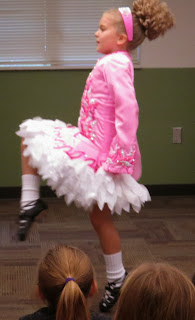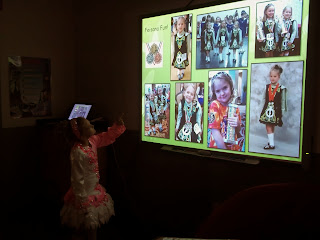I was fortunate enough to attend a spectacular high school in Wales where I developed a taste for black pudding and Marmite, made personal connections that persist to this day, and became acquainted with other Celtic cultures as well. I'm pleased to share what I've learned through some wonderful literature - but it's even nicer when students can connect lessons to their own heritage and interests.
This week several classes will be fortunate enough to experience a step dance performance by one of our 3rd graders who danced for us in the library to several lively Irish tunes:
She explained a lot about Irish dancing and how she got started, answered questions from the audience, and showed us a PowerPoint presentation she created about step dancing and her personal connection to Ireland:
It was a wonderful experience that was a huge hit with her schoolmates! This young woman shared her belief that champions are "made, not born" and described her dedicated daily practice in pursuit of her goal of excellence.
If you have a child in grades K-3, ask him or her to explain selkies, wee folk, and what the legends say about why there are no snakes in Ireland!
Check out the fantastic works of Susan Cooper, from Celtic folktale picture books to chapter books for older readers, such as her Dark is Rising series, set in Wales and Cornwall (another Celtic land). Two great Irish writers are Siobhan Dowd, for middle and high school, and Derek Landy for upper elementary and middle school. Gill Lewis is a Scottish veterinarian whose animal- and nature-themed chapter books are brilliant for middle grade readers.






